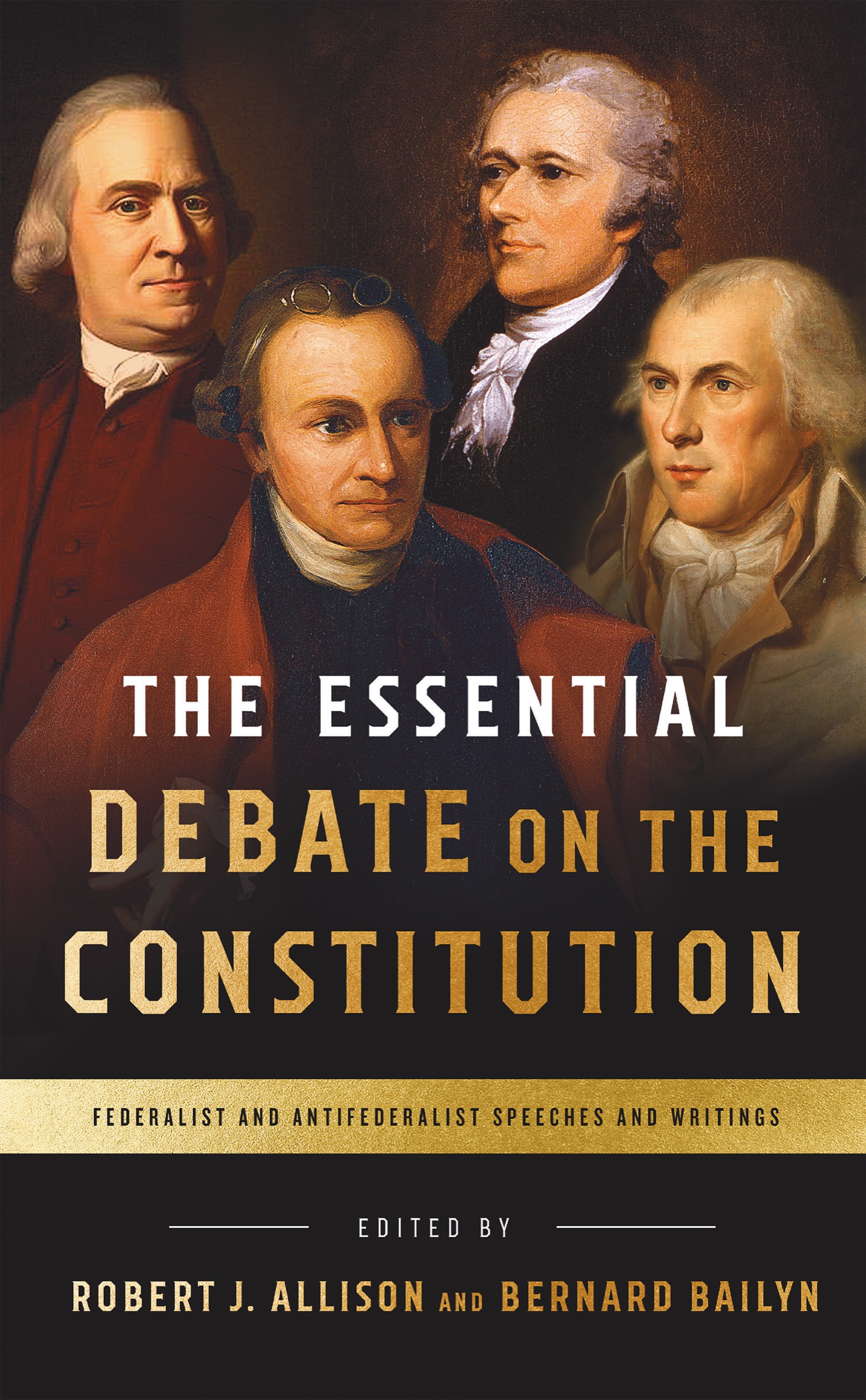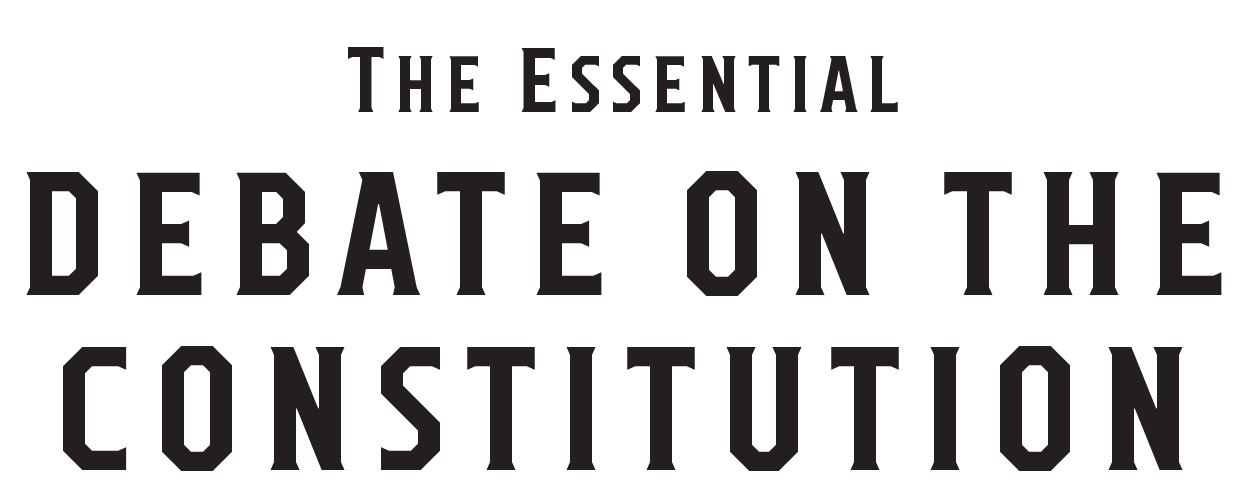FEDERALIST AND ANTIFEDERALIST
SPEECHES AND WRITINGS
The brilliant battle of ideas
that still shapes the nation
Robert J. Allison and Bernard Bailyn, editors

LIBRARY OF AMERICA E-BOOK CLASSICS
THE ESSENTIAL DEBATE ON THE CONSTITUTION
Preface, introduction, volume compilation, and back matter copyright
2018 by Literary Classics of the United States, Inc., New York, N.Y.
All rights reserved.
No part of this book may be reproduced in any manner whatsoever without
the permission of the publisher, except in the case of brief
quotations embodied in critical articles and reviews.
Published in the United States by Library of America.
Visit our website at www.loa.org.
Some of the material in this volume is reprinted with the
permission of holders of copyright and publishing rights.
For more information see the Note on the Texts.
These contents are drawn from The Debate on the Constitution,
edited by Bernard Bailyn, volume #62 and #63 in the
LOA series. For a full table of contents and more information visit
our website at www.loa.org.
Distributed to the trade in the United States
by Penguin Random House Inc.
and in Canada by Penguin Random House Canada Ltd.
Library of Congress Control Number: 2018936418
e ISBN 9781598535877
Contents
Preface
BY BERNARD BAILYN
I WRITE THESE WORDS at a time when the Founders Constitution is being tested as never before in the two centuries and more of the nations existence. Their intricate constitutional design, worked out in the Convention of 1787 and debated for months in 1788, was for a national state strong enough to provide for citizens needs and to compete in the worlds great affairs without intruding on the citizens freedoms. But they knew how delicate free states are and how difficult it would be for their descendants to preserve the constitutional republic they were creating. The dominant theme in everything they said and wrote in the great ratification debate of 178788 was to prevent the free republican state they were creating from descending into a tyrannical or what they called an arbitrary statewhat we call an authoritarian or fascist statein which a charismatic demagogue would cut through or ignore or distort the structure of law, install his corrupt minions in high office, protect them by use of the pardoning power, and block citizens freedom to speak and to challenge those who ruled. They knew only too well, from history and from their contemporary world, how such a debasement of free states could happen. They had seen it again and again. And they knew, and assumed, that beyond all the crucial constitutional details that the states were debating lay basic assumptions on which the entire edifice of freedom rested.
They assumed that while party zealots and men of selfish ambition would always be present, there must also, always, be informed men of independent judgment who would serve the public interest without seeking benefits to themselves and who were not intimidated by ruthless magistrates. But they were not blind optimists. They believed that man in his deepest nature was selfish and corruptthat the lust for wealth and power was so overwhelming that no one should ever be entrusted with unqualified authority. The Constitutions intricate system of checks and balances would help, but they feared that there might not be virtue enough for success. Could not some ignorant but clever and ruthless leader manipulate and then sweep aside the delicate structure of constitutional government to satisfy his passion for power and establish a corrupt regime? Madison, in the Federalist papers and in the Virginia ratifying convention, put it directly. As there is a degree of depravity in mankind which requires a certain degree of circumspection and distrust; So there are other qualities in human nature, which justify a certain portion of esteem and confidence.
I go on this great republican principle, that the people will have virtue and intelligence to select men of virtue and wisdom. Is there no virtue among us? If there be not we are in a wretched situation. No theoretical checksno form of government can render us secure.
The same anxious but optimistic thought came with embellishments from Hamilton. He knew that in proportion that riches and luxury prevail, virtue will tend to become a mere graceful appendage of wealth, and the tendency of things will be to depart from the republican standard. But he still believed that the supposition of universal venality in human nature is little less an error in political reasoning than the supposition of universal rectitude. The institution of delegated power implies that there is a portion of virtue and honor among mankind, which may be a reasonable foundation of confidence.
The Founders assumed also that they would succeed in preserving the free state they were creating only if the people retained the right to challenge the government in open, public expression. If that failed, if the public press was in some way muzzled or undermined and the corrupt regime monopolized the public discourse immune from public challenges, the free state would be in mortal danger. Jefferson put it dramatically. If, he wrote, I had to choose between a government without newspapers, or newspapers without a government, I should not hesitate a moment to prefer the latter. The only way to safeguard public liberty, he added, is to give the people full information of their affairs thro the channel of public papers [that should] penetrate the whole mass of the people. For, he said, the basis of our governments is the opinion of the people.
And they assumed, even without saying so, that beyond everything else that a free state required for its survival lay respect for the law and for the courts that enforced and defined it. Many of the Founders were lawyers: Jefferson, Hamilton, Adams, Wilson, Dickinson, Jay, Iredell, Ellsworth, Patrick Henry, and others. And those who were not lawyers by profession learned something of the law in the public debates, and shared the respect for the law and the courts as foundations of free states. A magistrate at any level who disparaged the courts and defied or twisted the course of justice could only be a despot who would rule for his own sake and was a danger to the peoples freedoms. But they knew how difficult impartial adherence to the law could be. The entire struggle with Britain in the 1760s and 70s had been a struggle over lawParliaments lawwhich they knew they were defying, and so it was only gradually and in desperation that they came to accept their defiance as legitimate. And nothing is more revealing of their respect for law and the courts than the speed with which states moved to reinstitute in republican terms the legal systems they had known. For they knew that regimes dominated by men and not by law would lead to anarchy, which would inevitably become the arbitrary state they so deeply feared.
It was fearof the encroachment of authoritarian rulethat drove the fierce debate of 178788 on to its conclusion, and it was passionfor the highest ideals of statecraftthat kept the debates aloft from the squalor of angry disagreements. Both are revealed in the pages that follow, which contain the essential documentation of what the Founders achieved.

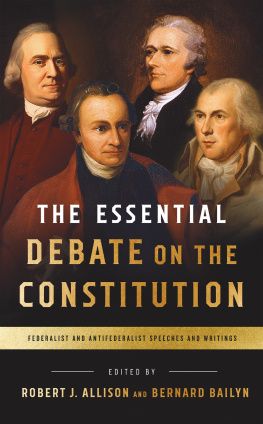
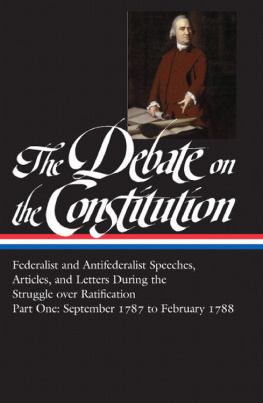

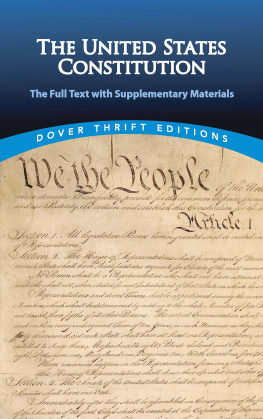
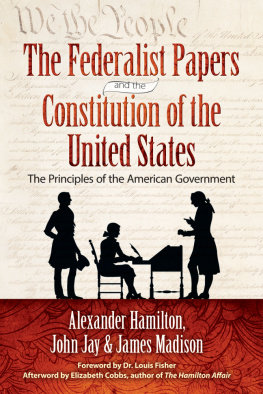
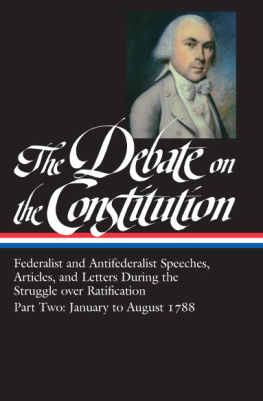

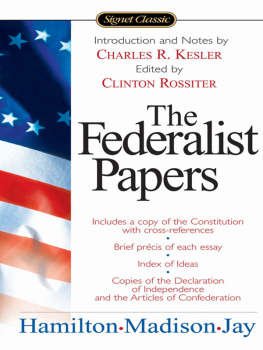
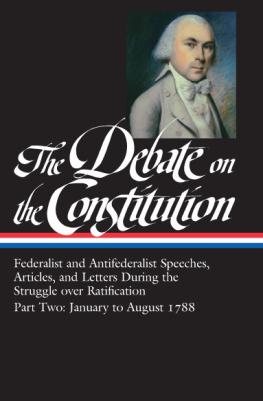
![Jay John - The Federalist : a collection of essays, written in favour of the new Constitution, as agreed upon by the Federal Convention, September 17, 1787. : In two volumes. Vol. I[-II.]](/uploads/posts/book/76130/thumbs/jay-john-the-federalist-a-collection-of-essays.jpg)
